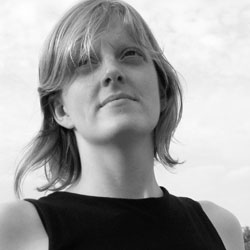I don’t want to see the city through
myself anymore. I imagine an open body
stuck with pins and flags ready
for labelling. The city is a city of constant
sidewalk repairs and household renovations.
If I could lay my hands on the interior walls
I would know enough to miss myself.
The city is a city of streets named
after saints and explorers. On the dock
I am cold. I imagine myself
at an art gallery looking at installations
and not pretending there can be
any sort of understanding.
But somewhere the water
may meet the unseen shore
and someone like you believes
it happens. There
is a line where they touch.
I would like to speak
to that line and have it speak
to me in return.
Notes on the Poem
The poems of The Certainty Dream by Kate Hall all have that clear-eyed, precise and utterly wacky conviction about what is right according to the opaque, hilarious and sometimes terrifying logic of dreams. This conviction, which could be the certainty of the collection's title, permeates almost every poem in this collection, and "Dream in Which I Am Separated from Myself" is no exception. "I don't want to see the city through myself anymore." You could interpret the opening line of this poem in a pretty straightforward fashion: the speaker doesn't want to experience the city through her own senses and perceptions, but maybe through someone else's. But wait. Maybe the speaker's body had become transparent, and the city was literally visible through it - and somehow, this is making perfect sense in the context of a dream, which often juxtaposes the mundane with the bizarre, but treats the bizarre as the mundane. Then this follows: "I imagine an open body stuck with pins and flags ready for labelling." That line between the water and the "unseen shore" can mean the separation, or the bringing together, of many things. Sometimes, it's only in a dream that the connection is made, and you get to speak to and understand that line. Kate Hall captures here and throughout The Certainty Dream the truths that are driven home to us through the whimsy and sudden clarity of the dream state.

The first thing that came to mind was the great line by the sculptor Isamu Noguchi, which he used in his Guggenheim Fellowship application, “I wish to see nature through nature’s eyes.” In the end, I think he actually master the trick of doing that. Unfortunately, his other quest, ‘to see Noguchi through Noguchi’s eyes’ was probably less successful; his life a riddle of binary oppositions (east/west, japanese/irish-american, stone/water, place/mu, mother/father, language/silence..). Somehow, they all never quite touched one another in a single assemblage.